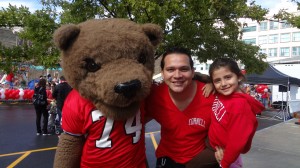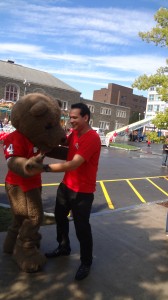I have compiled some tips to help guide your success in the next phase of your life, the Cornell MPA program. I have proposed some of my own experiences in the demanding MBA program I just finished in Costa Rica and also my new MPA program. Some of these might seem obvious but only a few people actually apply them.
Hopefully, if you combine these suggestions with your own abilities and efforts, you will succeed in the next two years and be able to tango with Red Bear instead of having nightmares.
This is a once-in-a-lifetime experience
A graduate program is a once-in-a-lifetime opportunity, particularly in an Ivy League school. You will probably never be in such a diverse and academic environment again. There are a lot of students who complain about their workload and are obsessed with their grades, but that’s just wasted energy and time. Focus on your assignments and helped your classmates who have trouble with some areas. Also devote energy and critical thinking to your papers and projects for their valuable learning experience. You are your only competition. Try to assess every day: What have I learned? What can I do to participate more fully in the next class? What are my weaknesses?
Build your network with your new best friends. In our new networked society, academic performance is important but is not going to get you a good job just because you are a straight A student. Emotional intelligence, the ability to embrace other cultures, and your social capabilities and leadership skills are equally important to success. Nowadays you need to be a great student but also a good networker.
Avoid studying in your comfort zone
Your room is the worst place to study because of its coziness and distractions. Look for a war room or a place that makes you feel like you are in an office. Plan your reading time strategically so you will be in places around campus that are on the way to your classes. In my case, depending on the day, I study in Olin, Mann, or the Statler lounge.
Evade procrastinating and use your time for reading wisely. My friend Juan Pablo Gomez and I developed a tool to provide graphic support for our weekly reading workload. It might help you, too:
https://www.dropbox.com/s/hk1gqc9cx1h95kf/Agosto%2027%20to%20Set%201.xlsx
Concept maps
As a teacher and a student I used concept maps.These are a great cognitive tool. Concept maps are visual representations of connections between major concepts and other ideas students have learned. These maps will help to develop:
- The ability to draw reasonable inferences from observations
- The ability to synthesize and integrate information and ideas
- The ability to learn concepts and theories in the subject area
Use technological tools for your papers
www.wordle.net (Word clouds)
www.gantter.com ( Gantt diagrams)
www.diagram.ly & www.gliffy.com (diagrams)
www.zoho.com (Project management)
www.easel.ly (infographics)
Speed reading and directed skimming
It is very difficult to read everything you are assigned. You have to develop the ability to understand the key points, frameworks and the underlying assumptions behind them without reading every word. This is a skill that can be developed over time, but I recommend that you take a speed reading course before coming to the program if you are not used to it.
Collaborative work and case analysis
Also, work as a team! Divide the reading among a serious and committed group of students and create formats with a structure that covers the analysis. If the reading is a case analysis, make sure you cover the following:
- Environmental analysis
- Problems and decision makers
- Objectives
- Alternatives
- Action plan
Allow yourself six to eight hours of uninterrupted sleep
If you can’t find time to sleep for six to eight hours, take a 30-min power-nap during the day to gain a boost of energy.
Spend quality time with your friends and Skype your family
Building stronger bonds with new friends will help decrease your level of stress and increase your level of empathy, love, support, and positive energy. Establish dinners once a week where everyone will prepare and eat a healthy meal while sharing a conversation.
Don’t forget that the essence of life is relationships; just because you have a lot to do, don’t forget about your friends and family back home. Use Skype or other online tools to stay in touch.
Music
For me this is essential. I always take 20 minutes per day just for listening to music. Try to listen to something that relaxes and inspires you.
http://www.youtube.com/
Exercise
Exercise can decrease stress, increase flexibility and balance, improve blood pressure control, strengthen your body overall and increase your level of optimism toward life.A good exercise program consists of cardio, stretching, and weight training. Keep a food journal to avoid poor eating. Protein will fuel your workouts and help you maintain lean muscle. A reliable accountability partner (in my case, my wife) can provide a foundation that will support you along your journey to creating permanent positive lifestyle changes for wellness and success.
Above all have fun, help other people, and learn. Good grades will come; they are not the end–they are part of the journey.
Pura Vida,
-A.


Hi Alvaro, tocayo, I am peruvian recently admitted to CIPA, I just read your blog and found it inspiring for future students like me, I was eager to contact someone currently studying at CIPA so as to have a first hand impression on how life at CIPA really is. Please let me know if I can contact you by email and talk a bit more about your experience at Cornell